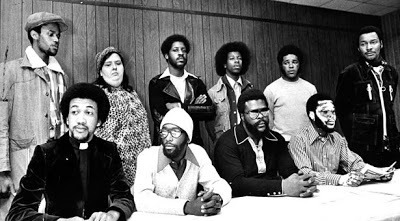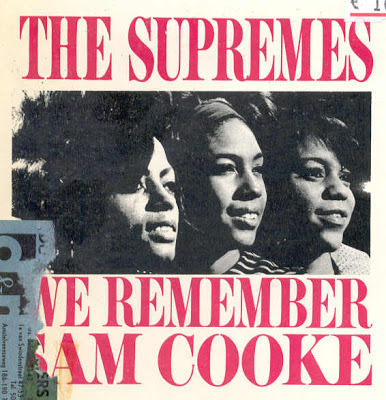Mark Anthony Neal's Blog, page 933
December 13, 2012
Native American Activist Leonard Peltier's Prison Plea for Long-Denied Clemency
DemocracyNow.org
During the holidays, the atmosphere of goodwill and mercy traditionally extends all the way to the nation's highest leaders, with presidents typically pardoning more prisoners than any other time in the year. On Friday, actors, musicians and activists are uniting to renew calls for clemency for one of America's most well-known and longest incarcerated prisoners: Leonard Peltier. The Native American activist and former member of the American Indian Movement was convicted of abetting the killing of two FBI agents during a shootout on South Dakota's Pine Ridge Indian Reservation in 1975. Peltier has long maintained his innocence; Amnesty International considers him a political prisoner who was not granted a fair trial. We air a never-before-broadcast video of Peltier from an interview by German journalist Claus Biegert.[image error]
Published on December 13, 2012 12:53
December 12, 2012
"Umi Says": The Beast & Nnenna Freelon
The Beast reinterpret Yasiin Bey's (Mos Def) "Umi Says" with Nnenna Freelon.[image error]
Published on December 12, 2012 20:47
Tell Me More: Violence Against Women Act Still In Limbo
[image error]
Published on December 12, 2012 15:38
Huffpost Live: When Ellen (Grossman) Met Jay-Z
HuffPost Live :
When Jay-Z traded his Maybach for a ride on the R train, a heartwarming conversation with an older lady, Ellen Grossman, seemingly unaware of who he was, ensued.[image error]
Published on December 12, 2012 15:29
Despite Protest of Michigan's Anti-Union Law, Deep Pockets of GOP Backers Prevail
DemocracyNow.org:
Michigan Republican Governor Rick Snyder has signed into law two highly controversial anti-union bills, officially making the historic union stronghold the 24th so-called "right-to-work" state in the country. On Tuesday, thousands of demonstrators flooded the state capitol in Lansing to denounce the bill as an organized attack against labor that will lower wages and diminish collective bargaining rights. [image error]
Published on December 12, 2012 15:15
It's Time for Women of Color to Talk Back

It's Time for Women of Color to Talk Back by YingYing Shang | HuffPost Teen
If you haven't seen the music video for 2 Chainz's "Birthday Song," the refrain is, "All I want for my birthday is a big-bootied hoe." The video reduces women to bouncing breasts and backsides; one women is actually laid out on a table covered in frosting.
This video is simply the newest addition to a long-standing pattern of degradation of colored women in the media, specifically in music videos. Between the songs and videos that reduce women of color to a large backside and a willing mouth, and the very real violence that confronts many women, the assault on women – both lyrically and literally – is stunning.
As a member of the SPARKteam, a group of girls fighting objectification of women in the media, I recently had the privilege of becoming involved in the fight against the degradation of women in the media industry. To fight back against the culture of misogyny, especially towards women of color, that has continued to spread throughout our culture, the media literacy group FAAN MAIL, which stands for Fostering Activism and Alternatives NOW, is pushing back against these degrading images. Based in Philadelphia, FAAN MAIL's founder, Nuala Cabral, wrote this moving and poignant criticism in the form of an open letter to CEO Lucian Grainge of Universal Music Group.
Lucian Grainge is not a name that most have heard of, in the colored community or otherwise. Yet he is CEO of the most powerful company in the music industry, and thus he should hold responsibility for promoting linguistically violent and degrading messages towards women of color.
Violence towards women of color is all too real. For every African-American woman that reports her rape, at least 15 African-American women do not report theirs. The National Violence Against Women Survey (NVAWS) found that 18.8 percent of African-American women reported rape in their lifetime. What degradation in the media does is normalize this behavior and desensitize us to these horrific statistics.
Media is insidious. We cannot separate the culture of objectification of women from literal, physical attacks, where women of color are often disproportionately targeted due to their exotification and stereotyped hypersexuality. From a culture that condoned slavery to the 19th century European freak shows that exhibited the "unusual" body of Saartjie Baartman, the dehumanization of women of color has a long history that still survives today. In Cabral's words in her open letter, CEO Lucian Grainge's lack of action in enforcing standards of basic humanity shows blatant disregard for black women's bodies -- the same disregard that enabled a history of forced sterilization, the shackling of birthing black mothers in prison. Universal Music Group's indifference resembles the indifference of a rape culture that overlooks the men who rape, while blaming the women and girls of color who experience sexual violence at disproportionate rates.
Silence and apathy, not only towards objectifying images in the media, but also towards cases of domestic violence towards women of color, speak volumes about the values of music corporations. Nineteen-year-old Def Jam rapper Lil Reese was recently caught on tape attacking a woman later identified as Tiairah Marie with a flurry of punches, continuing to kick her even after she fell. Although he later apologized on Twitter for his actions, UMG and Def Jam remained silent. And their silence and unwillingness to take a stand marks their endorsement of a corporate-sponsored culture of violence. From the images portrayed to the physical actions of their artists, Universal Music Group is allowing women of color to continue to be treated as objects.
It's time for this failure to shoulder responsibility to end. As long as these images and instances of domestic violence are condoned, women of color will never overcome the history of fetishization and objectification that manifests throughout the media today.
But FAAN MAIL is taking a stand. As an organization of colored women that SPARK is thrilled to collaborate with, FAAN is laying out an action plan. We, FAAN and its allies want transparency and accountability in the music industry. We want Universal Music Group to give platforms to artist who empower, not degrade and dehumanize, women of color. We want consequences for Lil Reese and other artists who promote violence against women through their actions and lyrics. We want a clear message communicated to the public that this sort of degradation of colored women violates basic human rights and cannot continue.
We want UMG, as the largest corporation in the music industry, to answer to these issues and propose concrete solutions. To achieve these goals, FAAN has published a "Talk Back" video with real women of color taking a stand. Join our Twitter Movement by publishing these two tweets:
@UMG stop degrading women of color in your music: http://goo.gl/3148n.
@UMG your silence speaks volumes. Stop condoning violence against women. Be transparent & respond. #LilReese
Together, let's hold the music industry accountable.
Follow YingYing Shang on Twitter: www.twitter.com/yingyingsmiles
***
YingYing Shang is a 16-year-old senior at Conestoga High School in Berwyn, Pennsylvania and a Teen Advisor to the United Nations Foundation campaign Girl Up. Girl Up is an innovative campaign of the United Nations Foundation giving American girls the opportunity to become global leaders and channel their energy and compassion to raise awareness and funds for United Nations programs that help some of the world’s hardest-to-reach adolescent girls.
Published on December 12, 2012 14:59
December 11, 2012
Our World with Black Enterprise Discusses Depression in Black Communities
BEMultiMedia
Our On the Record discussion looks at Depression within the African American community with Bassey Ikpi, director of the Siwe Project; Dr. Jeff Gardere, psychologist and author; and Terrie Williams, author of "Black Pain: It Just Looks Like We're Not Hurting."
Published on December 11, 2012 20:27
Justice for the Wilmington 10?
 The Wilmington 10
The Wilmington 10
The State of Things w/ Frank StasioWUNC-FM | 91.5
In 1972, 10 young activists in Wilmington were convicted of arson and conspiracy related to racial violence. Their conviction immediately became a worldwide cause. Now, legal notes from the original prosecutor of the case raise more questions about the fairness of the trial. The Wilmington 10 are seeking to clear their names with a pardon from outgoing Gov. Bev Perdue. Host Frank Stasio is joined by Timothy Tyson, a visiting professor of American Christianity and Southern Culture at Duke Divinity School; Irving Joyner, a professor of law at North Carolina Central University and co-chair of the Wilmington 10 Pardons of Innocence Project; and Cash Michaels, a journalist, filmmaker, and coordinator of the Wilmington 10 Pardons of Innocence Project.
Listen HERE [image error]
Published on December 11, 2012 18:32
FAAN Mail Talk Back: "Birthday Song"
FAANMail
In this Talk back FAAN Mail responds to the radio hit "Birthday Song" by 2 Chainz and Kanye West (owned and distributed by Universal Music Group). Topics explored include consumerism, capitalism, colorism, misogyny, corporate accountability and popular media & children.
Share your thoughts in the comments or join @faanmail, @UMG, @2Chainz & @KanyeWest for dialogue on twitter using the hash-tag #BirthdaySong.
FAAN Mail (Fostering Activism and Alternatives Now!) is a media literacy/activist project formed by women of color and based in Philadelphia. Together with our allies, we critique and create media with social change in mind. [image error]
Published on December 11, 2012 15:31
Remembering Sam Cooke and the Sound of Young America

Remembering Sam Cooke and the Sound of Young America by Mark Anthony Neal | NewBlackMan (in Exile)
On December 11, 1964, singer Sam Cooke, aged 33, was murdered under questionable circumstances inside a Los Angeles motel. Weeks after his death, Sam Cooke became one of the many martyrs of the Civil Rights Movement, when “A Change is Gonna Come,” a song that he recorded in 1963, was released and became an anthem of the Movement. But Cooke’s impact was much greater than the song, as he served as a role model for a generation of young Black artists seeking to balance their responsibilities as Black artists with the demands and allure of mainstream audiences who were beginning to welcome them. It was in this spirit that The Supremes released We Remember Sam Cooke in the spring of 1965.
To be sure there were many tributes to Sam Cooke after his death; friend and road-mate King Curtis recorded and album instrumental covers of Cooke’s songs. Otis Redding, in many ways Cooke’s heir-apparent, recorded versions Cooke’s songs throughout his career, beginning with his debut album Pain in My Heart (1964), which included a cover of Cooke’s pop breakthrough, “You Send Me.” It was with his signature album, Otis Blue: Otis Redding Sings Soul (which included the original version of “Respect”), that Redding pays fitting tribute to Cooke recording versions of “Shake,” “Wonderful World” and a rendition of “A Change is Gonna Come” that would have made Cooke proud.
The most surprising tribute came from the Motown camp, most well known in 1965 for its plastic Soul, of which the trio of Mary Wilson, Florence Ballard and Diana Ross were the flagship product. Signed to Motown in 1961 as The Primettes, The Supremes breakthrough occurred in the summer of 1964 when “Where Did Our Love Go?” topped the pop charts, beginning a remarkable string of five straight #1 pop singles from the summer of 1964 until the autumn of 1965 including signature tunes like “Come See About Me” and “Baby Love.”
Still existing somewhere between the teen pop scene that they had come to dominate and Berry Gordy’s vision of the group as an exemplar of what Andre Harrell would later call “High Negro Style,” We Remember Sam Cooke, seemed an odd choice for The Supremes. Indeed, “Stop in the Name of Love,” the trio fourth #1 pop single, topped the charts only a month before the release of the Cooke tribute.
But We Remember Sam Cooke, spoke broadly to Gordy’s intent to establish The Supremes as a premiere high-end pop entity. Gordy famously described his company as the “Sound of Young America,” making clear his ambition to reach the widest audience possible.
In that spirit, while the group was squeezing out chart-topping singles from their 1964 album Where Did Our Love Go?, The Supremes actually released three other albums in the period, A Bit of Liverpool (1964), The Supremes Sing Country, Western and Pop (1965) and finally We Remember Sam Cooke. With these recordings, Gordy was less interested in generating hit singles and more focused on highlighting the versatility of The Supremes, by celebrating their take on the British Invasion and Country & Western music (with a nod to Ray Charles). For Gordy, the end game was not simply the domination of the pop charts, but the establishment of The Supremes as a recognizable American brand that transcended the limits that racialized society posed for Black performers and entrepreneurs.
As The Supremes charted a path that would lead them to Las Vegas, only a few years after venues on the strip were desegregated, high end supper clubs like New York’s Copacabana, and concert spaces like the Philharmonic Hall at Lincoln Center, they looked up to a figure like Cooke, whose own ability to breakthrough in such spaces created opportunities for groups like The Supremes; The Supremes at the Copa (recorded in August of 1965) was released a year after Cooke’s own Sam Cooke at the Copa. At his peak, Cooke represented the ability of Black artists to balance the artistic sensibilities that were produced in the context of segregated Black life with the demands of a mainstream pop arena that largely demanded that Black artists forego the former. Sam Cooke was surely primed for greater mainstream success, when he was murdered. In many ways, The Supremes got to a promised land, that Cooke was not able to.
Though The Supremes never actively sought to record the kind of socially conscious music on the level of “A Change is Gonna Come” and were never intimately engaged to the Civil Rights struggle in the ways that figures like Cooke, Harry Belafonte and Nina Simone were (though they attended Martin Luther King, Jr.’s funeral), they successfully waged battle on behalf of respectable Black images in mainstream culture. Take for instance the impact of The Supremes fifteen appearances on The Ed Sullivan Show between 1964 and 1969, when Diana Ross bid adieu to The Supremes on Sullivan’s show; Their visibility on the highly rated Sunday night variety introduced many Americans to Black American style.
In a world where African-Americans were thought incapable of doing much beyond the symbolic confines of Black life, The Supremes recorded a tribute to the Great American Songbook with The Supremes Sing Rodgers and Hart (1967), released only months after The Supremes Sing Holland-Dozier-Holland (1967). The latter recording, importantly, had the effect of elevating the trio of Motown songwriters and producers (and the primary producers for The Supremes) to a level worthy of the Great American Songbook. What Berry Gordy understood was that Motown represented the best of what America could produce, and Sam Cooke was a constant reminder of what those possibilities were.
The legacy of the historic period that produced Sam Cooke and The Supremes, will be on display early next year, with the opening of Come See About Me: The Mary Wilson Supremes Collectionat the African American Museum in Philadelphia. The exhibit conceived by Mary Wilson, a founding member of the Supremes, will center on many of the gowns worn by the group in their heyday, as archival footage, photographs, and other representations of their rise from the Brewster Douglas Projects in Detroit to the most visible Black women in the world.
***
Mark Anthony Neal is the author of five books including the forthcoming Looking For Leroy: Illegible Black Masculinities , which will be published by New York University Press in April of 2013. He is professor of Black Popular Culture in the Department of African & African-American Studies at Duke University and the host of the Weekly Webcast Left of Black. Follow him on Twitter @NewBlackMan.
Published on December 11, 2012 10:30
Mark Anthony Neal's Blog
- Mark Anthony Neal's profile
- 30 followers
Mark Anthony Neal isn't a Goodreads Author
(yet),
but they
do have a blog,
so here are some recent posts imported from
their feed.



